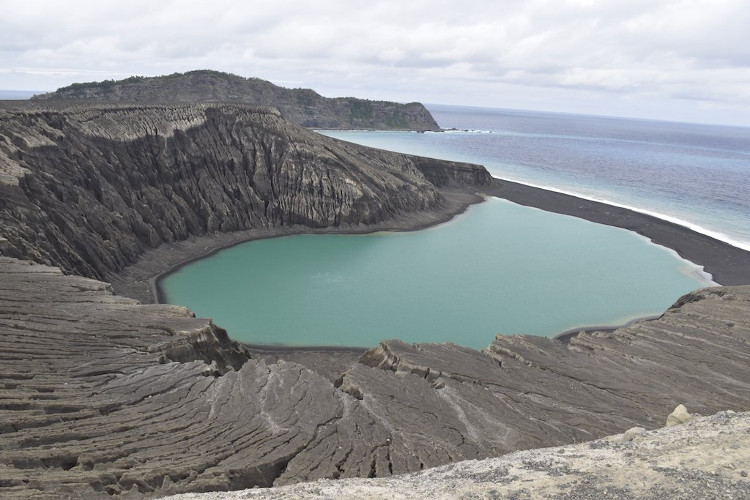Clues about life on Mars may be in the Pacific Ocean
Hunga Tonga Hunga Ha'apai, the world's youngest "island", is located about 65km northwest of Tonga's capital Nuku'alofa, possibly holding the key to human search.
The US Aeronautics and Space Administration (NASA) said December 13 that Hunga Tonga Hunga Ha'apai Island emerged from the Pacific Ocean in late 2014 - early 2015, after an incident there.

A corner of Hunga Tonga Hunga Ha'apai Island taken in June 2017.(Source: NASA).
Initially scientists thought that the island - made up of volcanic ash and rock - would be washed away by seawater within a few months. However, the last "fledgling" island was "tougher" than expected and stood firm today with a size of 1km, 2km long and 100m high.
Although not entirely "immune" to the effects of marine erosion, scientists predict that the 3-year-old island could survive for the next 6-30 years.
According to the researchers, the " resilience" of Hunga Tonga Hunga Ha'apai partly stemmed from natural conditions , warm seawater combined with ash from volcanic eruption that formed a rocky structure. Hardness like concrete.
Jim Garvin, head of NASA's Goddard Space Flight Center, said there is very little opportunity to study life cycles on a newly formed island.
According to the scientist, Mars also has many volcanic islands and there is evidence that they are also formed in water environments similar to those of Hunga Tonga Hunga Ha'apai or many other volcanic islands on Earth. . These may be "golden lands" for life that appear because of the combination of wet and high temperatures from the process.
The study of life processes that appeared on Hunga Tonga Hunga Ha'apai Island can thus provide clues to the journey of finding life on Mars, helping experts form a more precise staking area. need to focus on research.
- Mars can nourish life
- Why don't planes often fly across the Pacific Ocean?
- Did the ocean on Mars get into the rock?
- NASA robots detect precious clues about life on Mars
- Russian spacecraft 'has just fallen into the Pacific Ocean'
- 'Mars used to have many oceans'
- Life may have existed 700 million years on Mars
- Isolated life on the archipelago between the Pacific Ocean
- Find new clues about ancient life on Mars
- Discovered a huge gold store at the bottom of the Pacific Ocean
- The 7 biggest mysteries about Mars have not been discovered
- Mars used to have a huge ocean
 Announced 3 houses on the Moon and Mars
Announced 3 houses on the Moon and Mars Science proves: Mars also knows 'deflated'
Science proves: Mars also knows 'deflated' Elon Musk announced the price for a Mars trip was 11.6 billion VND, free of charge
Elon Musk announced the price for a Mars trip was 11.6 billion VND, free of charge NASA discovered strange 'gate' on Mars, is the hiding place found?
NASA discovered strange 'gate' on Mars, is the hiding place found? Mars used to be 'green planet' like Earth
Mars used to be 'green planet' like Earth  Did the ocean on Mars get into the rock?
Did the ocean on Mars get into the rock?  NASA discovered rod-shaped objects on Mars
NASA discovered rod-shaped objects on Mars  Discovering a 130-meter-thick ice shelf hidden under the surface of Mars
Discovering a 130-meter-thick ice shelf hidden under the surface of Mars  NASA announced a model for astronauts on Mars
NASA announced a model for astronauts on Mars  Close up of the majestic mountains on Mars
Close up of the majestic mountains on Mars 